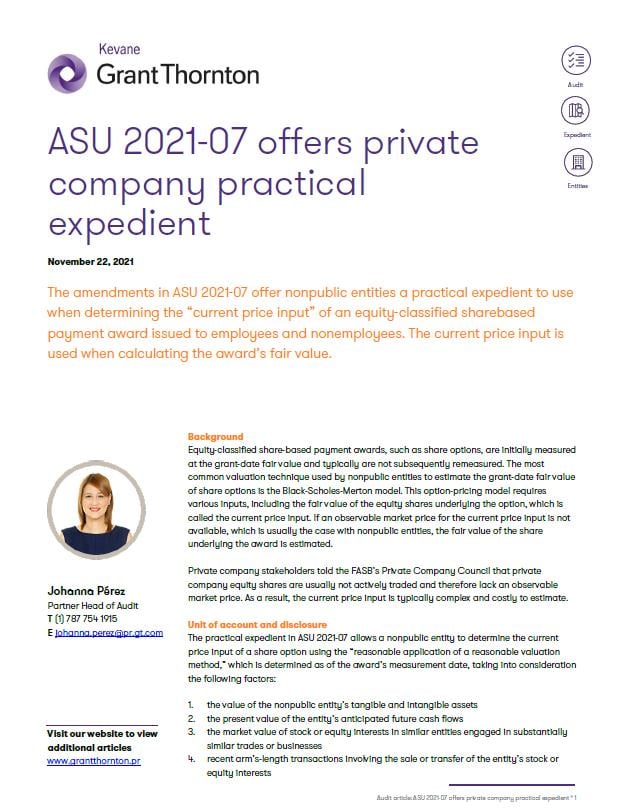-
Financial statements audits
Financial statement audits
-
Compliance audits
Compliance audits
-
Compilations and reviews
Compilations and audit
-
Agreed-upon procedures
Agreed-upon procedures
-
Corporate and business tax
Our trusted teams can prepare corporate tax files and ruling requests, support you with deferrals, accounting procedures and legitimate tax benefits.
-
International tax
Our teams have in-depth knowledge of the relationship between domestic and international tax laws.
-
Tax compliance
Business Tax
-
Individual taxes
Individual taxes
-
Estate and succession planning
Estate and succession planning
-
Global mobility services
Through our global organisation of member firms, we support both companies and individuals, providing insightful solutions to minimise the tax burden for both parties.
-
Sales and use tax and indirect taxes
SUT/ VAT & indirect taxes
-
Tax incentives program
Tax incentives program
-
Transfer Pricing Study
The laws surrounding transfer pricing are becoming ever more complex, as tax affairs of multinational companies are facing scrutiny from media, regulators and the public

-
Business consulting
Our business consulting services can help you improve your operational performance and productivity, adding value throughout your growth life cycle.
-
Forensic and investigative services
At Grant Thornton, we have a wealth of knowledge in forensic services and can support you with issues such as dispute resolution, fraud and insurance claims.
-
Fraud and investigations
The commercial landscape is changing fast. An ever more regulated environment means organizations today must adopt stringent governance and compliance processes. As business has become global, organizations need to adapt to deal with multi-jurisdictional investigations, litigation, and dispute resolution, address the threat of cyber-attack and at the same time protect the organization’s value.
-
Dispute resolutions
Our independent experts are experienced in advising on civil and criminal matters involving contract breaches, partnership disputes, auditor negligence, shareholder disputes and company valuations, disputes for corporates, the public sector and individuals. We act in all forms of dispute resolution, including litigation, arbitration, and mediation.
-
Business risk services
We can help you identify, understand and manage potential risks to safeguard your business and comply with regulatory requirements.
-
Internal audit
We work with our clients to assess their corporate level risk, identify areas of greatest risk and develop appropriate work plans and audit programs to mitigate these risks.
-
Service organization reports
As a service organization, you know how important it is to produce a report for your customers and their auditors that instills confidence and enhances their trust in your services. Grant Thornton Advisory professionals can help you determine which report(s) will satisfy your customers’ needs and provide relevant information to your customers and customers’ auditors that will be a business benefit to you.
-
Transactional advisory services
Transactions are significant events in the life of a business – a successful deal that can have a lasting impact on the future shape of the organizations involved. Because the stakes are high for both buyers and sellers, experience, determination and pragmatism are required to bring deals safely through to conclusion.
-
Mergers and acquisitions
Globalization and company growth ambitions are driving an increase in M&A activity worldwide as businesses look to establish a footprint in countries beyond their own. Even within their own regions, many businesses feel the pressure to acquire in order to establish a strategic presence in new markets, such as those being created by rapid technological innovation.
-
Valuations
We can support you throughout the transaction process – helping achieve the best possible outcome at the point of the transaction and in the longer term.
-
Recovery and reorganization
We provide a wide range of services to recovery and reorganisation professionals, companies and their stakeholders.
Background
Equity-classified share-based payment awards, such as share options, are initially measured at the grant-date fair value and typically are not subsequently remeasured. The most common valuation technique used by nonpublic entities to estimate the grant-date fair value of share options is the Black-Scholes-Merton model. This option-pricing model requires various inputs, including the fair value of the equity shares underlying the option, which is called the current price input. If an observable market price for the current price input is not available, which is usually the case with nonpublic entities, the fair value of the share underlying the award is estimated.
Private company stakeholders told the FASB’s Private Company Council that private company equity shares are usually not actively traded and therefore lack an observable market price. As a result, the current price input is typically complex and costly to estimate.
Unit of account and disclosure
The practical expedient in ASU 2021-07 allows a nonpublic entity to determine the current price input of a share option using the “reasonable application of a reasonable valuation method,” which is determined as of the award’s measurement date, taking into consideration the following factors:
- the value of the nonpublic entity’s tangible and intangible assets
- the present value of the entity’s anticipated future cash flows
- the market value of stock or equity interests in similar entities engaged in substantially similar trades or businesses
- recent arm’s-length transactions involving the sale or transfer of the entity’s stock or equity interests
- other relevant factors, such as control premiums or discounts for lack of marketability
- the entity’s consistent use of a particular valuation method to determine the value of stock or assets for other purposes
Finally, the amendments state that the “reasonable application of a reasonable valuation method” cannot utilize a value calculated more than 12 months earlier than the measurement date, and that the value utilized must be updated for all subsequent information material to the value of the entity.
The amendments specifically acknowledge that a valuation performed in accordance with Treasury Regulation §1.409A-1(b)(5)(iv)(B) would comprise the “reasonable application of a reasonable valuation method.
Grant Thornton insight
It is important to keep in mind that the practical expedient does not change the fair-value measurement objective for the current price input of the option pricing model, nor does it affect existing audit requirements around management’s judgments and estimates.
Unit of account and disclosure
The practical expedient may be elected on a measurement date–by–measurement date basis, meaning a nonpublic entity must apply the amendments to all share-based payment awards with the same underlying share and the same measurement date. Nonpublic entities must also disclose their use of the practical expedient.
Effective date and transition
Entities may early apply the practical expedient, including in an interim period, for any financial statements that have not yet been issued or made available for issuance as of October 25, 2021, which is the date when the ASU was issued.
Otherwise, the practical expedient may be applied prospectively for all equity-classified awards granted or modified during fiscal years beginning after December 15, 2021 and during interim periods within fiscal years beginning after December 15, 2022.
Source: Grant Thornton Insight October 28, 2021
We are committed to keeping you up to date of all developments that may affect the way you do business in Puerto Rico. Please contact us for further assistance in relation to this or any other matter.


